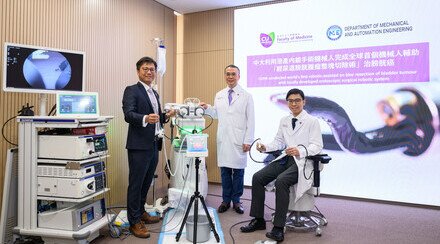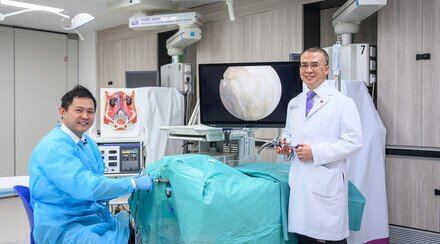Results of the First 3,500 Participants of the CUHK Jockey Club Multi-Cancer Prevention Programme Demonstrate that “One-stop Multi-Cancer Screening” is Effective
Supported by the donation of over HK$35 million from The Hong Kong Jockey Club Charities Trust, The Chinese University of Hong Kong (CUHK) announced the results of the early phase of the CUHK Jockey Club Multi-Cancer Prevention Programme (the Programme) today. Since the commencement of the Programme in 2018, it has already provided screening services to over 3,000 eligible citizens. More than 70% of the participants were diagnosed either with adenoma or advanced adenoma through colonoscopy, while ten persons were diagnosed with colorectal cancer.
For those who underwent colorectal cancer screening, almost all of them were willing to be screened for another type of cancer. Subsequently, 15 participants were diagnosed with breast cancer and another 37 participants were diagnosed with prostate cancer. The research team believes that the screening results demonstrated the effectiveness of the “one-stop multi-cancer screening” model and advocates the implementation of this model to the cancer screening programme in the future.
.
Results of the early phase of the CUHK Jockey Club Multi-Cancer Prevention Programme were announced today. Since the commencement of the Programme in 2018, 3,500 eligible citizens have received their service. 7.9% of the participants were diagnosed either with adenoma, advanced adenoma or even colorectal cancer; 0.8% of female participants were diagnosed with breast cancer while 2.4% of male participants were diagnosed with prostate cancer.
(From left) Prof. Simon NG, Division of Colorectal Surgery, Department of Surgery, Faculty of Medicine, CUHK; Dr. Polly CHEUNG, Founder of the Hong Kong Breast Cancer Foundation; Ms Tse, a patient who was diagnosed with early-phase breast cancer through the Programme; Prof. Joseph SUNG, Director of CUHK Jockey Club Multi-Cancer Prevention Programme; Mr. Leong CHEUNG, Executive Director, Charities and Community, The Hong Kong Jockey Club; Professor Samuel WONG, Director of The Jockey Club School of Public Health and Primary Care; and Professor Anthony NG, Division of Urology, Department of Surgery; Faculty of Medicine, CUHK.
Around one-third of Hong Kong's population over the age of 15 are obese
According to the Population Health Survey conducted by the Department of Healt[1], there are 29.9% of the Hong Kong’s population within 15 to 84 years old are defined as obese and 20.1% of the population are defined as overweight. Obesity is the most common in the age group of 65 to 84 and 45 to 54 in females and males respectively.
For the Chinese adults in Hong Kong, it is defined as overweight if the body mass index (BMI) is between 23 kg/m2 and less than 25 kg/m2, while obese is defined as BMI equals to 25 kg/m2 or above. There are studies showing that obesity and overweight are related to some cancers. The table below illustrates the obesity-induced risk for colorectal cancer, breast cancer and prostate cancer.
Colorectal Cancer | The risk of developing colorectal cancer or adenoma for obese (BMI ≥ 25kg/m2) people is 1.5 times of normal people.[2] |
Breast Cancer |
|
Prostate Cancer | The relative risk is 1.09 for every 5-unit increase in BMI[4] |
Latest figures of colorectal, breast and prostate cancer – top ten most common cancers in Hong Kong
Latest figures of the top ten cancers released by the Hospital Authority[5] show that there are 5,635 colorectal cancer cases in 2017, which placed the top among all cancers for five consecutive years. Meanwhile, breast cancer has been the most common women's cancer since 1994, with 4,373 cases. Prostate cancer placed the fourth with 2,240 cases in the top ten cancers, with the greatest increase in incidence rate of 17.2% from 2016 to 2017.
In view of the increasing severity of obesity and cancer in Hong Kong, the Programme aims to decode the relation between obesity and the above three cancers. The Programme was funded by The Hong Kong Jockey Club Charities Trust in 2018 for five years and targeted to recruit 10,000 Hong Kong residents at the age between 40 and 75 who are free of cancer symptoms. In addition to colorectal cancer screening, male and female participants are provided with prostate cancer and breast cancer screening respectively.

Prof. Joseph SUNG states that the aim of the CUHK Jockey Club Multi-Cancer Prevention Programme is to raise public awareness on cancer in order to nip it in the bud.

Prof. Simon NG points out that adenoma and advanced adenoma are pre-cancerous conditions of colorectal cancer. Without timely diagnosis, these conditions will develop to colorectal cancer.
Programme results of the early phase
As of 18 August 2020, there were 3,446 eligible subjects enrolled in the Programme and were provided with cancers screening together with metabolic syndrome screening. There are 3,018 participants (approximately 90%) who are either overweight or with central obesity. As some of the participants have cancer symptoms or with contraindications, they were only able to join one of the three cancer screenings. The screening results are as below:
Colorectal cancer
There were 3,230 participants suitable for colorectal cancer screening. Among them, 367 subjects showed positive results in fecal immunochemical tests and were referred for undergoing colonoscopy as a follow-up. Among 347 colonoscopy reports, 151 subjects were found to have adenoma; 95 subjects have advanced adenoma and ten people were diagnosed with colorectal cancer. Adenoma and advanced adenoma are pre-cancerous conditions of colorectal cancer. Without timely diagnosis, these conditions will develop to colorectal cancer.
Prostate cancer
There were 1,516 subjects suitable for prostate cancer screening. Among them, 98 subjects were tested for prostate specific antigen or prostate health index and referred for undergoing prostate ultrasound and prostatic biopsy test. Among 91 prostatic biopsy reports, 37 prostate cancer cases were found.
Breast cancer
There were 1,846 subjects suitable for breast cancer screening. Among them, there were 45 subjects with positive mammogram results and were referred for undergoing breast ultrasound and biopsy test. Among 41 breast biopsy reports, 15 breast cancer cases were diagnosed.

Dr. Polly CHEUNG (right) reminds that women in general should undergo breast cancer screening every two years. .

Prof. Anthony NG states that early-stage prostate cancer does not have many obvious symptoms, and one fourth of the cancer cases found in this screening programme are already in stage three or even stage four.
Continual of recruitment
Professor Joseph SUNG, Director of the CUHK Jockey Club Multi-Cancer Prevention Programme and Mok Hing Yiu Professor of Medicine of CUHK stated, “The recruitment of our programme has been ongoing. Apart from fighting against COVID-19, cancer is a life-threatening disease that we need to nip it in the bud. The aim of the Programme is to raise the awareness of the residents who are in our targeted age group on their colorectal health and overweight or obese issues. The problem of COVID-19 should fade out one day, yet the problems of cancer and weight control will continue in our society.”
“The Hong Kong Jockey Club believes that prevention is better than cure. Cancer screening is an effective way of cancer prevention as it allows early detection such that patients can receive treatment as soon as possible. The Club is a strong supporter of cancer prevention, treatment and support services. We are also working with different institutions and universities to strengthen Hong Kong’s cancer research and treatment standards by providing diversified services as well as timely and appropriate assistance to patients and their carers,” said Mr Leong Cheung, Executive Director, Charities and Community of The Hong Kong Jockey Club.
In addition to cancer screening, there were 50 diabetes mellitus (DM) cases newly diagnosed through the Programme. Not only these DM cases are provided with referrals, but the overweight or obese subjects are also supported by the Programme with classes on exercises and diets which will be started in 2020. These classes aim to assist participants in weight management in order to reduce their risk in developing cancers. For further information of the Programme, please feel free to visit https://mcp.cuhk.edu.hk.
Please visit https://mcp.cuhk.edu.hk/form/ for registration of the Programme.

Ms. Tse (left) was diagnosed with breast cancer stage one through the CUHK Jockey Club Multi-Cancer Prevention Programme in 2019. She wishes to draw more attention among the public to the risk of cancer through sharing her experience. On the right is Prof. Samuel WONG.

A group photo of the CUHK team and representatives from The Hong Kong Jockey Club participating in the CUHK Jockey Club Multi-Cancer Prevention Programme.
[1] Centre for Health Protection, Department of Health, HKSAR https://www.chp.gov.hk/en/healthtopics/content/25/8802.html
[2] Wong MC, Lam TY, Tsoi KK, et al. A validated tool to predict colorectal neoplasia and inform screening choice for asymptomatic subjects. Gut. 2014;63(7):1130-6.
[3] Harvie M, Hooper L, Howell AH (2003) Central obesity and breast cancer risk: a systematic review. Obesity Reviews 4: 157-173.
[4] Cao Y, Giovannucci E (2016) Obesity and Prostate Cancer. Recent Results Cancer Res 208: 137-153.
[5] Hong Kong Cancer Registry, Hospital Authority https://www3.ha.org.hk/cancereg/topten.html














































